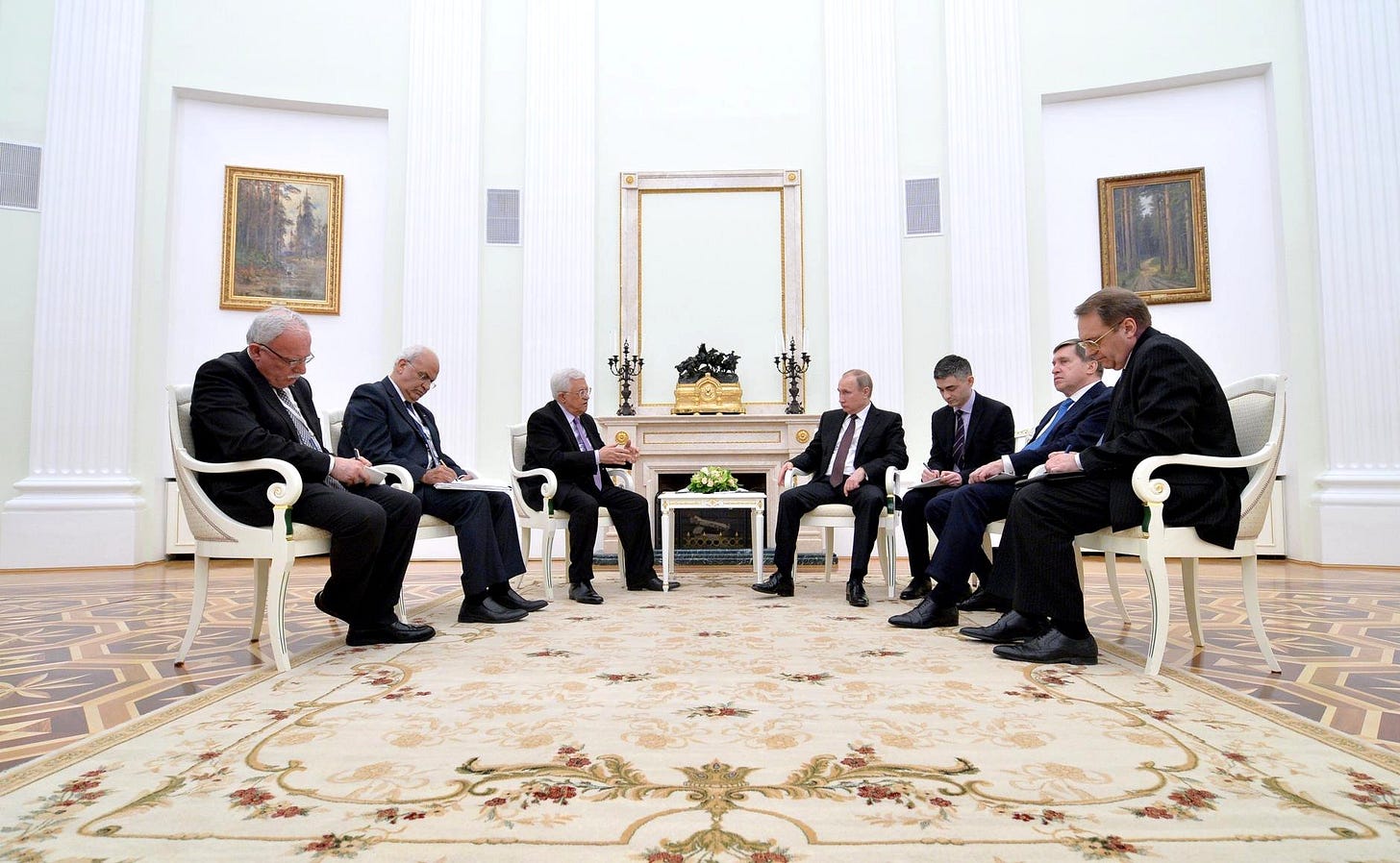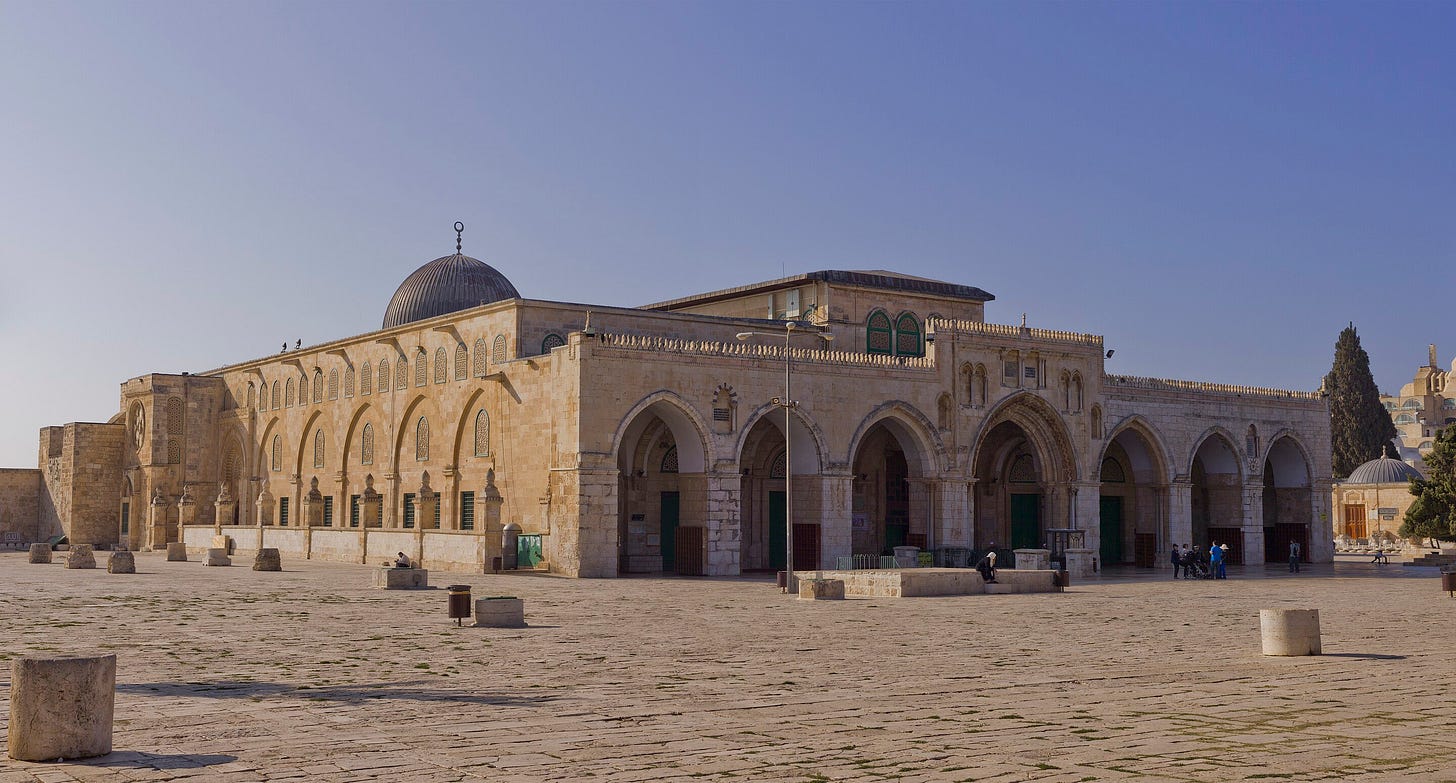The Palestinians do not want your two-state solution.
Understanding the Israeli-Palestinian conflict predominantly through the lens of Palestinian aspirations for statehood obscures much deeper issues at play here.
Please consider supporting our mission to help everyone better understand and become smarter about the Jewish world. A gift of any amount helps keep our platform free of advertising and accessible to all.
You can also listen to the podcast version of this essay on Apple Podcasts, Google Podcasts, and Spotify.
Share this essay using the link: https://www.futureofjewish.com/p/palestinians-do-not-want-your-two-state-solution
As some European countries threaten to recognize a “Palestinian state” in the coming weeks, and as U.S. President Joe Biden said this week that he is “working to make sure we finally get a two-state solution” to the Israeli-Palestinian conflict, someone should remind these people: The Palestinians do not want your two-state solution.
Since Israel emerged victorious in 1948 Israeli-Arab war — the Jewish state’s War of Independence — the Israeli-Palestinian conflict has long been portrayed in the West as a battle for Palestinian statehood.
While partially true for some Palestinians, this narrative oversimplifies a complex web of historical, ideological, and geopolitical factors.
Understanding the conflict predominantly through the lens of Palestinian aspirations for statehood obscures deeper issues at play — while overlooking what the Palestinians could very well try to do to Israel (judging from a large historical sample size) should they have a launching pad that Westerners call a state.
Historical and Ideological Roots
To comprehend the Israeli-Palestinian conflict, one must first consider its historical and ideological roots. The conflict is not a mere territorial dispute but a clash of national identities, historical narratives, and religious ideologies.
The Jewish connection to the land of Israel dates back millennia, with deep religious and historical significance. For Jews, Israel represents not just a homeland but a sanctuary from centuries of persecution.
The Zionist movement, which gained momentum in the late 19th and early 20th centuries, sought to establish a Jewish state in response to increasingly catastrophic antisemitism in Europe, as well as throughout the Middle East and North Africa.
On the other hand, Arabs have inhabited the region for centuries, developing their own cultural identity. Yet the rise of mainstream Palestinian nationalism can be traced back only to the 1960s, some two decades after the State of Israel was established in 1948. In other words: Palestinian nationalism was by and large a response to Zionism (and, one could argue, a reaction to Western footprints in the Middle East).
Israel’s War of Independence (what the Arabs call the “Nakba” (Arabic for “catastrophe”) was, from the Palestinians’ side, not a battle for statehood. It was a genocidal war that the Arabs waged against the Jews to stop Jewish statehood in its tracks. Prior to 1948, many Palestinians wanted to be part of “Greater Syria.”
The establishment of the State of Israel in 1948, following a UN partition plan rejected by the Arabs and Arab states, led to the first Arab-Israeli war and the displacement of hundreds of thousands of Palestinians. The “Nakba” remains a central grievance for Palestinians, symbolizing their loss of homeland.
It would be one thing if the Israelis outright stole this “homeland” from the local Arabs, but the Arabs started a war, lost it, and the Palestinians and their supporters have been crying about it for 76 years.
No group of people on our planet is afforded this opportunity — starting a genocidal war which ended in defeat, and then crying about it to the tune of billions in foreign aid and forever-victim status, so long as there is a Jewish state in the Middle East, in the Jews’ indigenous homeland.
Power Dynamics and Regional Politics
The conflict cannot be detached from the broader geopolitical dynamics of the Middle East. Israel has been influenced by its relationships with regional and global powers. The Cold War, for instance, saw Israel align with the United States circa 1967, while many Arab states (and the Palestinians) were supported by the Soviet Union.
Today, Israel’s security concerns are shaped by threats from non-state actors like Hezbollah and Hamas, as well as regional adversaries such as Iran and even Qatar.
The Islamic Republic of Iran, in particular, has a vested interest in the Palestinian cause, using it as a tool to expand its “Axis of Resistance,” embolden its plans for regional hegemony, and challenge the West via Israel. This external support complicates any straightforward resolution to the conflict, as it transforms the Palestinian issue into a proxy battleground for regional power struggles.
What’s more, Qatar and Iran presumably use their “influence” (i.e. money, threats) across international bodies like the United Nations and its agencies, the Red Cross, and the International Criminal Court, to delegitimize the State of Israel.
We have also witnessed the same engineering within Western institutions like education, media, culture, and politics — all of which are becoming increasingly anti-Israel.
After decades of failed Arab waged wars to eliminate the Jewish state, this “diplomatic” avenue is one of the only ways to “defeat” Israel.

The Role of Ideology and Religion
The Israeli-Palestinian conflict is also deeply rooted in ideological and religious differences. For many Israelis, especially those more religious-leaning, the land of Israel is a God-given inheritance that cannot be compromised. This belief fuels the settler movement in Judea and Samaria (also known as the West Bank), where religious and nationalist settlers see their presence as a fulfillment of biblical prophecy.
Conversely, for many Palestinians, the struggle is not just for statehood but for the liberation of all historic “Palestine.” Groups like Hamas, an Islamist organization, view the entire territory from the Jordan River to the Mediterranean Sea as Islamic waqf (endowment) land that cannot be relinquished. Hamas’ charter explicitly calls for the destruction of Israel and the establishment of an Islamic state in its place.
Yet the West brushes off Hamas, Palestinian Islamic Jihad, and other Palestinian terrorist groups as “no big deal” — ultimately suffering from an acute perception gap regarding the Middle East, where key players operate motivated by ideological, mostly religious fervor, in contrast to those in the West who adhere to realpolitik theories that are based on a belief in the ability to evolve and solve through economic means.
The U.S. and its “coalition of the willing” have personally experienced bitter experiences in this regard, primarily the wars in Iraq and Afghanistan. These began with a pretense of optimism and ended in retreats, thus reflecting a failure in trying to engineer consciousness and bend ideologies via democratic and monetary levers.
The 36-year confrontation between Israel and Hamas, culminating in this current war, bears a similar test case for Western difficulty in comprehending foreign cultures, such as:
The projection of one’s own logic onto the other (in particular the belief that there is a universal human longing for a “good life”)
Differentiating between a society where ideologies have less weight (Israel) and a society where they are still powerful (Gaza)
An inability to decipher a society whose perceptions of time, life, and seeing “the other” in its proximity are different
Even then, the questions raised in parts of Israel and the West regarding Hamas illustrate deep fundamental cultural gaps. Is it a terrorist organization, a political party, or a social movement? Actually, all of them together. Is Hamas more Palestinian or more Islamic? Both, to the same extent.
And what is the difference between “political” Hamas and “military” Hamas? Nothing, it is just manipulative mental gymnastics that the organization consciously created for the purpose of deception.
Many hypotheses are indulged by politicians and pundits about October 7th; for example that the organization wanted to damage normalization between Israel and Saudi Arabia. This reflects a lack of understanding of Hamas — such that Jihad in and of itself is its essence, and its purpose is to undermine Israel on the way to its destruction.
And if the Palestinians, both in Gaza and the West Bank, were to be given elections today, Hamas has been projected to win in a landslide — and not in spite of October 7th, because precisely because of it.
Sure, Hamas does not represent all Palestinians, but the attacks it led on October 7th incited passions of many in the broader Arab and Muslim world, greatly strengthening the Islamist perception of the Arab-Israeli conflict as a Muslim-Jewish one.
In pursuit of this goal, Hamas named its operation against Israel “Al-Aqsa Flood,” dedicating its murderous assault to Jerusalem’s Al-Aqsa Mosque, the third-holiest shrine in Islam.
The West, meanwhile, sees the problem as political and territorial in nature. To some Palestinians, this is the case, but for Hamas, Palestinian Islamic Jihad, Hezbollah, their supporters, and their chief sponsor, the Islamic Republic of Iran, it is primarily religious, and at its heart is the annihilationist fantasy of ending the Jewish state by killing as many Jews as possible.

International Influence and Mediation
The international community plays a crucial role in the Israeli-Palestinian conflict, often mediating peace efforts and providing aid. However, international involvement is frequently marked by competing interests and biases.
The United States, for example, has historically been a staunch ally of Israel, providing military and diplomatic support. This support has often been perceived by Palestinians and their supporters as one-sided, undermining America’s role as an impartial mediator.
Other international actors, including the European Union and United Nations, have attempted to balance this by advocating for Palestinian rights and statehood. However, their influence is limited by geopolitical realities and the complexities of the conflict.
Regardless, politicians, diplomats, and commentators are already looking beyond the fighting between Israel and Hamas for solutions to the Arab-Israeli conflict — a sort of secular Western conviction that all humanity’s problems are solvable. They typically look at the Arab-Israeli dispute as simply a clash of national, political, and territorial claims. In other words, problems that can be solved.
But the absolutist tenets of fundamentalist Islam cannot be compromised with, and there is no easy solution to an eliminationist ideology inspired by religion. Nothing is gained by pretending these tenets do not exist or are only harbored by an inconsequential few.
“We make mistakes all the time when we don’t take folks in the Middle East, the radical set, at face value,” said Reuel Marc Gerecht, a former Iranian-targets officer in the CIA. “It’s a serious error on our part, which we repeat over and over and over again.”1
“Israel and the Islamic Republic of Iran.” Sapir.



One of the best summaries I’ve read on this conflict. I shared with my network on LinkedIn.
Correct. The belief they want a state is nothing short of a clinical delusion.